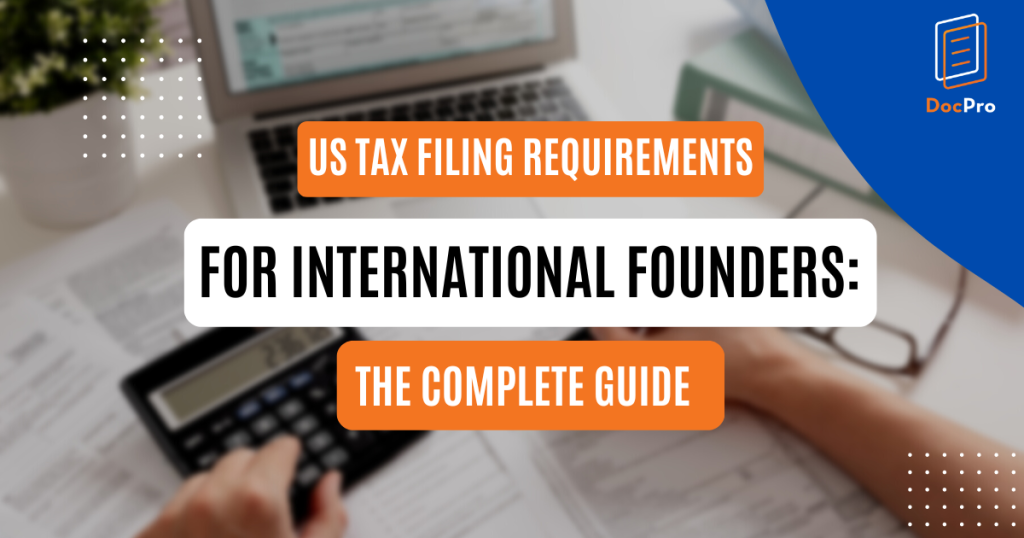US Tax Filing Requirements for International Founders: The Complete Guide
19 May 2023
19 May 2023
min read

The United States has one of the most complex tax codes and subsequent filing requirements in the world—both for individuals and businesses—and it can be incredibly confusing. However, if you are an international founder, tax filing requirements can be even more stringent and could vary in nature based on multiple factors.
As the international founder of a business, it is incredibly important to be aware and vigilant of compliance measures in order to align with filing requirements; factors such as immigration status, business structure, and presence in the United States all contribute.
No matter what type of business you run, including an LLC in California it is necessary for you to understand your obligations and comply with U.S. tax laws to avoid penalties and legal issues.
Key Considerations for International Founders: An Overview
Immigration Status
It is necessary for an international founder to realize that their U.S. immigration status can impact tax obligations and their tax filing requirements. Resident Aliens (RAs) and Non-Resident Aliens (NRAs) are subject to different rules. For instance, a French citizen/non-resident alien who owns a business in France as well as one in the U.S. will only be taxed on their U.S. income. Resident aliens, however, could be taxed on all forms of income generated—no matter the country.
Business Structure
Different business structures have different filing requirements. Two common structures for international founders are sole proprietorship and incorporation (such as forming a C corporation or an LLC). Sole proprietors must file an individual tax return. Corporations must file a corporate tax return regardless of if the business suffered a loss or made a profit.
Tax Residency
An international founder must determine the status of their U.S. tax residency, which is done by the substantial presence test or by holding a green card. A tax resident is generally subject to U.S. taxation on worldwide income, including that derived from foreign businesses and investments. Additionally, this could include income earned prior to the international founder moving to the U.S. Non-residents are only subject to tax on income sourced in the U.S.
Employment Taxes
If an international founder operates their business through a U.S. entity and receives a salary, they also may be subject to employment taxes, including paying into Social Security and Medicare. These taxes are also matched by the employer. Additionally, if you are an international founder who has U.S.-based employees at a U.S.-based entity, you will be responsible for 940 and 941 tax filings and required to provide your employees with a W2 form each year.
Self-Employment Taxes
For international founders who operate their business as a sole proprietor or as a certain type of pass-through entity, such as a partnership or an LLC, this individual may also be subject to self-employment taxes on net business income. Self-employment taxes in the U.S. cover Social Security and Medicare contributions.
Tax Treaties
The United States has varied tax treaties in place with many countries around the world. In turn, these treaties can impact an international founder’s tax obligations and their filing requirements. Ultimately, these treaties exist to offer relief from double taxation, can provide varied tax benefits, and establish residency tie breaker rules. International founders or their trusted agents should always review relevant tax treaties between the U.S. and the founder’s home country to understand what is applicable to their own situation and identify any potential tax advantages.
Special Reporting Requirements
International founders who have financial accounts located outside of the United States may also be required to report those accounts to the Financial Crimes Enforcement Network (FinCEN) by filing the Foreign Bank Account Report (FBAR). It could also be necessary to report them on Form 8938—Statement of Specified Foreign Financial Assets, which is dependent on the balance of the account and subsequent thresholds.
Filing Deadlines
Typically, there are two major tax filing dates in the United States; March 15th for corporate returns and April 15th for individual returns. It is possible to file an extension, enabling one to file their returns by October 15th. However, it is important to note that filing an extension simply extends the reporting deadline; if taxes are owed, they still must be paid earlier in the tax year.
Consult with a Tax Professional
As the international founder of a U.S.-based business, it can feel confusing and overwhelming to truly understand what tax filing requirements pertain to your situation and what you are accountable for. Ultimately, you want to stay on the right side of the IRS. Therefore, you are encouraged to consult with a tax professional so you are fully aware of what tax filing requirements are applicable as well as what forms you are responsible for filing and when. Partner with a tax pro you can trust and realize the benefits of operating your business in the United States.
Keywords: